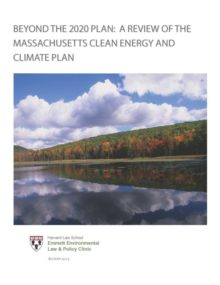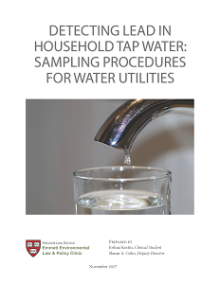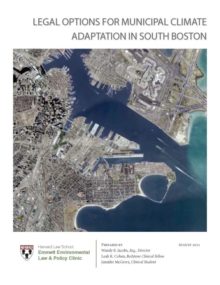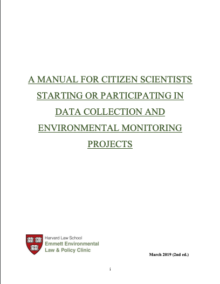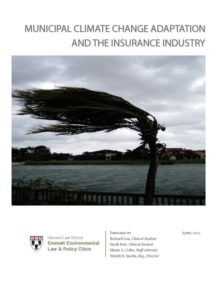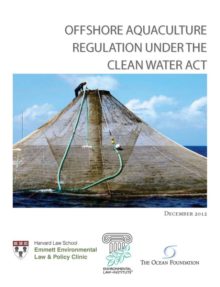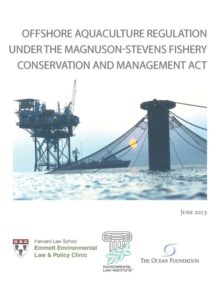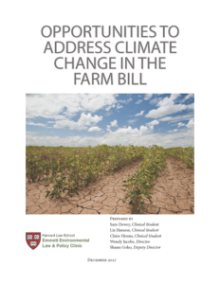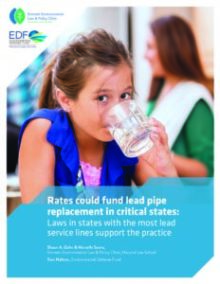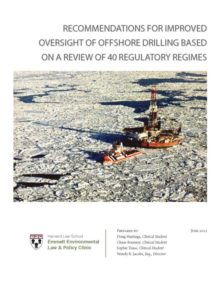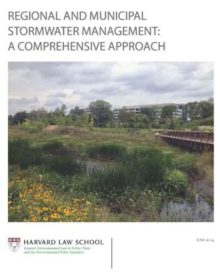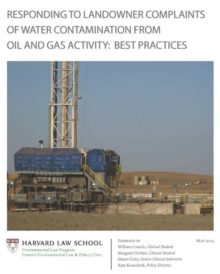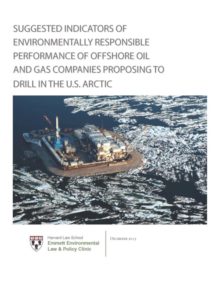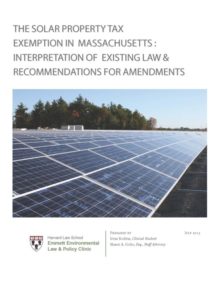In its work, the Clinic produces a variety of work product, including white papers; model or draft statutes, ordinances, and regulations; comments on proposed regulations or permits; amicus briefs; guides; and published articles. Below are a sampling of these publications.
To search through all the Clinic’s publications, please use the drop-down menus below.
A Landowner’s Guide to Hydraulic Fracturing: Addressing Environmental and Health Issues in Oil and Gas Leases (Revised Edition, July 2014)
Guides • Fracking
This expanded and revised edition of the guide builds upon the previous edition. In particular, it is aimed at landowners across the country and contains information relevant for property owners who are considering whether to sign a lease to allow either oil or gas extraction by hydraulic fracturing, including proposed lease language.
A Manual for Citizen Scientists Starting or Participating in Data Collection and Environmental Monitoring Projects (First Edition, September 2017)
Guides • Citizen Science
This manual aims to empower individuals in their roles as citizen scientists and to promote the practice of community-based citizen science as a vehicle for environmental justice. It outlines practical suggestions for how to design and carry out a citizen science project. It also contains an overview of relevant laws and regulations, as well as technical suggestions regarding data collection, analysis, and compliance with relevant scientific and quality standards.
American Lung Association v. EPA (D.C. Cir. No. 19-1140)
Amicus Briefs • Climate Change
On April 24, 2020, the Clinic filed an amicus brief on behalf of a number of leading climate scientists, economists, and the Union of Concerned Scientists in the litigation over the Affordable Clean Energy (ACE) Rule, EPA’s replacement for the Clean Power Plan.
Kelsey Cascadia Rose Juliana v. United States of America (9th Cir. No. 18-36082)
Amicus Briefs • Climate Change
On March 1, 2019, the Emmett Environmental Law & Policy Clinic filed an amicus brief on behalf of a group of public health experts, public health organizations, and doctors in Juliana v. United States, the landmark climate case brought by a group of youths against the federal government. The Clinic’s brief explains that the generation of children and youth represented by the plaintiffs (the “Juliana Generation”) is already experiencing climate-related adverse health effects and that these effects will worsen over their lifetimes.
National Family Farm Coalition, et al. v. U.S. Environmental Protection Agency, et al. (9th Cir. No. 17-70196)
Amicus Briefs • Agriculture
On February 16, 2018, the Clinic filed an amicus brief in the Ninth Circuit on behalf of several farmer support organizations challenging the Environmental Protection Agency’s approval of Monsanto’s XtendiMax—a new formulation of the highly-volatile and toxic herbicide dicamba. The brief explains that EPA’s approval of the herbicide resulted in widespread harm throughout the South and Midwest in 2017, and that farmers who want to plant soybeans feel that they have lost their freedom of choice: either they plant Monsanto’s resistant seeds or risk having their crops killed by drift from a neighboring farmer’s field.
Benefits of Regulating Hazardous Air Pollutants from Coal and Oil-Fired Utilities in the United States
Articles • Clean Air Act
Elsie M. Sunderland, et al., Benefits of Regulating Hazardous Air Pollutants from Coal and Oil-Fired Utilities in the United States, Enviro. Sci. Technol. (January 15, 2016) (Shaun Goho and Wendy Jacobs were contributing authors on this report). Click here for related news release.
Beyond the 2020 Plan: A Review of the Massachusetts Clean Energy and Climate Plan
White Papers • Climate Change
This report, published in August 2013, presents a dozen concrete suggestions to help the Commonwealth of Massachusetts achieve its greenhouse gas emissions reduction goals under the Global Warming Solutions Act. Suggested measures include promoting of electric vehicle use and promoting the transition to LED (light emitting diodes) public lighting both on municipal roads and on property managed by state agencies.
Brockton Power Company, LLC v. Energy Facilities Siting Board (Mass. SJC No. 11405)
Amicus Briefs • Clean Water Act
In February 2014, the Clinic filed an amicus brief in support of a decision by the Massachusetts Energy Facilities Siting Board disapproving the use of the City of Brockton’s municipal water supply as the primary source of cooling water for a proposed electric-generating facility. The Clinic argued, on behalf of non-profit conservation and resource stewardship groups, that the impacts of such proposed large water uses must be evaluated with respect to both individual water bodies and the watersheds in which those waters are located.
California Rural Legal Assistance Foundation, et al. v. Environmental Protection Agency, et al. (9th Cir. No. 21-71287)
Amicus Briefs • Defense of Science
On June 1, 2022, the Clinic submitted an amicus brief on behalf of three leading experts supporting a challenge to an action by the U.S. Environmental Protection Agency (EPA) involving the toxic herbicide paraquat dichloride (often simply called “paraquat”). Specifically, EPA approved paraquat’s use for the next fifteen years under certain conditions, despite the risks paraquat poses to public health.
Carbon Capture and Sequestration
Articles • Agriculture
Wendy B. Jacobs and Michael T. Craig, Carbon Capture and Sequestration (Mar 2019). Chapter 28, Legal Pathways to Deep Decarbonization in the United States (Michael B. Gerrard and John C. Dernbach eds., ELI 2019).
Carbon Capture and Sequestration
Articles • CCS
Wendy B. Jacobs, Carbon Capture and Sequestration. Chapter 17, Global Climate Change and U.S. Law, 2nd ed. (Michael Gerrard & Jody Freeman, eds., The American Bar Association, April 2014).
Center for Food Safety v. Vilsack (9th Cir. 12-15052)
Amicus Briefs • Agriculture
In April 2012, the Clinic filed an amicus brief on behalf of organic farmers, producers of organic foods, and organic advocacy organizations in a case challenging the Department of Agriculture’s decision to allow the unrestricted use of Roundup-Ready alfalfa (RRA). The Clinic argued that the agency’s decision will cause significant economic harm to the organic industry and that a more limited deregulation decision, which imposed geographic restrictions and buffer zones, would reduce this harm.
Certifications for Green Infrastructure Professionals – The Current State, Recommended Best Practices, and What Governments Can Do to Help
White Papers • Climate Change Adaptation
This July 2014 report released by the Clinic and the Environmental Policy Initiative surveys the current state of Green Infrastructure (GI) professional certification programs, discusses obstacles to the development of widely accepted certifications, and suggests measures that governments can take to promote certification programs. The report also recommends best practices for GI certification program design and implementation based on design options observed in existing GI certification
City of Brockton v. Energy Facilities Siting Board (Mass. SJC No. 11406)
Amicus Briefs • Clean Air Act
Questions before the Massachusetts Supreme Judicial Court in this case included whether the Massachusetts Energy Facilities Siting Board failed to appropriately consider whether a proposal to construct a new power plant complied with the Massachusetts Executive Office of Energy and Environmental Affairs’ Environmental Justice Policy. The Clinic, on behalf of an environmental advocacy organization, argued that, when a project has potential to impact environmental justice neighborhoods, the Environmental Justice Policy requires both enhanced opportunities for public participation and equal protection against environmental burdens, including an enhanced analysis of impacts on environmental justice communities.
Climate Adaptation and Liability: A Legal Primer and Workshop Summary Report
White Papers • Climate Change Adaptation
The Clinic assisted in developing the legal content for this report from the Conservation Law Foundation and the Boston Green Ribbon Commission. The report focuses on how potential liability may advance or inhibit implementation of adaptation approaches, synthesizes the workshop discussions, and concludes with recommended next steps for addressing barriers to implementing adaptive solutions.
Climate Adaptation Article 80 Guidance and Checklist
Statutes, Ordinances, and Guidance • Climate Change Adaptation
This memorandum proposes and explains guidance and a checklist under which the City of Boston could incorporate climate adaptation considerations in its Article 80 development review process.
Climate Adaptation Procurement Guidance
Statutes, Ordinances, and Guidance • Climate Change Adaptation
This memorandum proposes and explains guidance under which the City of Boston could incorporate climate adaptation planning in its procurement process.
Comments in Support of Brookline’s Prohibition on New Fossil Fuel Infrastructure in Major Construction
Comments on Regulations and Other Agency Actions • Climate Change Adaptation
On February 27, 2020, the Clinic submitted comments on the first municipal bylaw in Massachusetts to limit the use of natural gas in new and modified buildings. Writing on behalf of Mothers Out Front Massachusetts, the Clinic’s explained that Brookline’s “Prohibition on New Fossil Fuel Infrastructure in Major Construction” (Article 8.39) reflects a traditional exercise of municipal authority that is not preempted.
Comments on BOEM’s Draft Second Supplemental Environmental Impact Statement (DSSEIS) for the Chukchi Sea Planning Area, OCS Oil and Gas Lease Sale 193
Comments on Regulations and Other Agency Actions • Offshore Oil and Gas
On December 22, 2014, the Clinic submitted comments on the Bureau of Ocean Energy Management’s (BOEM) Draft Second Supplemental Environmental Impact Statement (DSSEIS) for the Chukchi Sea Planning Area, OCS Oil and Gas Lease Sale 193. The Clinic’s comments focused on BOEM’s analysis of the impacts of a Very Large Oil Spill, particularly (1) BOEM’s assumption that operators could stop an end-of-season spill during the Arctic winter and (2) shortcomings in the analysis of impacts of oil spill dispersants on wildlife and indigenous communities.
Comments on Coastal Plain Oil and Gas Leasing Program Draft Environmental Impact Statement (DOI-BLM-AK-0000-2018-0002-EIS)
Comments on Regulations and Other Agency Actions • Offshore Oil and Gas
On March 13, 2019, the Clinic submitted comments to the Bureau of Land Management (BLM) regarding the Draft Environmental Impact Statement (DEIS) issued by BLM to implement an oil and gas leasing program within the Arctic National Wildlife Refuge Coastal Plain. The Clinic encouraged BLM to revise the DEIS’ analysis of greenhouse gas emissions and oil spills to reflect the full scope of the potential impacts.
Comments on D.P.U. 20-80, Investigation by the Department of Public Utilities on its Own Motion into the Role of Gas Local Distribution Companies as the Commonwealth Achieves its Target 2050 Climate Goals
Comments on Regulations and Other Agency Actions • Climate Change
In June 2021, the Clinic filed a comment letter on behalf of a group of Massachusetts municipalities and regional planning associations in the Department of Public Utility’s investigation regarding the role of local gas distribution companies in helping the Commonwealth achieve its 2050 net zero climate goal, which includes reducing greenhouse gas emissions by at least 85%.
Comments on D.P.U. Docket 15-155 regarding tariff changes proposed by National Grid
Comments on Regulations and Other Agency Actions • Climate Change
On April 6, 2016, the Clinic submitted comments in the Massachusetts Department of Public Utilities (DPU) Docket 15-155, regarding a utility’s request for approval of new electric distribution rates. The Clinic recommended that DPU review the proposed plans from an energy justice perspective and proposed the creation of a new tariff for virtual power plants to promote the deployment of distributed energy resources.
Comments on D.P.U. Dockets 15-120, 15-121 and 15-122 for approval of Grid Modernization Plans
Comments on Regulations and Other Agency Actions • Climate Change
On April 14, 2016, the Clinic submitted comments in the Massachusetts Department of Public Utilities (DPU) proceedings reviewing requests by investor-owned electric companies to approve their proposed grid modernization plans. The Clinic recommended that DPU review the proposed plans from a holistic energy justice perspective that considers access to benefits from innovation in the electric sector as well as impacts on consumer costs. The Clinic also asked that DPU create opportunities for the development and integration of virtual power plants into Massachusetts’ electric system as a way of advancing DPU’s vision of a modern grid that is cleaner, more efficient and more reliable while empowering customers to manage and reduce their energy costs.
Comments on DOI’s Draft Regulations on Oil and Gas and Sulphur Operations on the Outer Continental Shelf – Requirements for Exploratory Drilling on the Arctic Outer Continental Shelf
Comments on Regulations and Other Agency Actions • Offshore Oil and Gas
On May 27, 2015, the Clinic submitted comments on the Department of the Interior’s (“DOI”) proposed regulations for offshore exploratory oil drilling in the Arctic. The Clinic supported the agency’s proposals to require that operators maintain a secondary drill rig in the Arctic to respond to potential losses of well control and that operators have prompt access to, and immediately deploy, source control and containment equipment in the event of an oil spill.
Comments on Draft Safety Culture Policy Statement for Offshore Drilling
Comments on Regulations and Other Agency Actions • Offshore Oil and Gas
On March 20, 2013, the Clinic submitted comments to the Bureau of Safety and Environmental Enforcement (BSEE) on BSEE’s Draft Safety Culture Policy Statement for Offshore Drilling. In the comments, the Clinic argues that the draft’s focus on process safety is overly narrow, and that the Bureau should “guide organizations to design a safety culture that embeds a meaningful commitment to environmental safety and protection.”
Comments on IRIS Assessment Plan for Methylmercury (Scoping and Problem Formulation Materials) [EPA/635/R-18/292] (Docket ID No. EPA-HQ-ORD-2018-0655)
Comments on Regulations and Other Agency Actions • Aquaculture
On May 6, 2019, the Emmett Clinic submitted comments on the Environmental Protection Agency’s IRIS Assessment Plan for methylmercury on behalf of a group of scientists led by Professors Philippe Grandjean of the T.H. Chan School of Public Health and Elsie Sunderland of the Harvard John A. Paulson School of Engineering and Applied Sciences.
Comments on National Emission Standards for Hazardous Air Pollutants: Coal-Oil-Fired Electric Utility Steam Generating Units – Reconsideration of Supplemental Finding and Residual Risk and Technology Review, 84 Fed. Reg. 2670 (Docket ID No. EPA-HQ-OAR-2018-0794)
Comments on Regulations and Other Agency Actions • Clean Air Act
On April 17, 2019, the Clinic submitted comments on behalf of a group of leading scientists in opposition to the Environmental Protection Agency’s proposal to rescind the finding underlying its regulation of mercury and other toxic air pollutant emissions from coal-fired power plants.
Comments on Petition of Pacific Legal Foundation, et al., for Rule-making under the Administrative Procedure Act
Comments on Regulations and Other Agency Actions • Endangered Species Act
On June 6, 2018, the Clinic submitted comments to the U.S. Fish & Wildlife Service and National Marine Fisheries Service opposing a petition from the Pacific Legal Foundation to establish regulatory definitions for the terms “species” and “subspecies” under the Endangered Species Act. The Clinic’s comments, on behalf of several eminent biologists, explain that the proposal is inconsistent with the use of those terms in the scientific community.
Comments on PHMSA’s Advanced Notice of Proposed Rulemaking for Oil Spill Response Plans for High-Hazard Flammable Trains
Comments on Regulations and Other Agency Actions • Climate Change
On September 30, 2014, the Clinic, in collaboration with Earthjustice, the Sierra Club, ForestEthics, and Oil Change International submitted comments on an Advanced Notice of Proposed Rulemaking issued by the Pipeline and Hazardous Materials Safety Administration (PHMSA) of the U.S. Department of Transportation (DOT) on potential revisions to its rules establishing the threshold for comprehensive oil spill response planning (OSRPs) by railroads carrying crude oil.
Comments on Proposed Dept. of Interior Natural Resources Planning and Development Document Records Schedule, Control No. DAA-0048-2015-0003
Comments on Regulations and Other Agency Actions • Defense of Science
On November 26, 2018, the Emmett Clinic filed comments on behalf of itself and other environmental and natural resources law clinics, research librarians, and nongovernmental organizations regarding the Proposed Department of the Interior Natural Resources Planning and Development Document Records Schedule. The Clinic urged the agency to reject the Proposed Records Schedule and to revise it to ensure the ability of the public to access federal records under the Freedom of Information Act (FOIA).
Comments on Proposed Interim Registration Review Decision for Chlorpyrifos and Revised Draft Human Health Risk Assessment, 85 Fed. Reg. 78,849
Comments on Regulations and Other Agency Actions • Defense of Science
On February 5, 2021, the Clinic submitted a comment letter urging the Environmental Protection Agency (EPA) to reverse its proposed registration decision for chlorpyrifos and revise the underlying Human Health Risk Assessment (HHRA). The Clinic’s letter calls into question EPA’s decision to use 10% red blood cell acetyl cholinesterase (AChE) inhibition as the basis for the toxicological point of departure, and argues that the HHRA’s refusal to rely on the findings of a key epidemiological study is irrational and contrary to EPA’s longstanding commitment to rely on the best available science.
Comments on Proposed Modification of General Permit WGMR064
Comments on Regulations and Other Agency Actions • Fracking
On November 16, 2011, the Clinic submitted comments on the Pennsylvania Bureau of Waste Management’s proposed revisions to general permit WGMR064. The revision would allow the use of natural gas well brines for dust suppression and road stabilization purposes.
Comments on Proposed Regulations to Implement the Fishery Management Plan for Regulating Offshore Aquaculture in the Gulf of Mexico
Comments on Regulations and Other Agency Actions • Aquaculture
On October 27, 2014, the Clinic, in collaboration with the Environmental Law Institute (ELI), submitted comments on regulations proposed by the National Marine Fisheries Service (NMFS) to implement the Fishery Management Plan for Regulating Offshore Aquaculture in the Gulf of Mexico (FMP). The Clinic and ELI made a number of recommendations to help the NMFS further address and minimize environmental risks and impacts of offshore aquaculture.
Comments on Proposed Revocation of the 2020 Reconsideration, and Affirmation of the Appropriate and Necessary Supplemental Finding, 87 Fed. Reg. 7624 (Docket ID No. EPA-HQ-OAR-2018-0794)
Comments on Regulations and Other Agency Actions • Clean Air Act
On April 11, 2022, the Emmett Clinic submitted comments supporting the Environmental Protection Agency’s (EPA) proposal to reaffirm earlier findings underlying the agency’s regulation of mercury and other toxic air pollutant emissions from coal-fired power plants. The comments were filed on behalf of a group of leading scientific experts in the atmospheric transport, aquatic fate, bioaccumulation, human exposures, and health outcomes associated with mercury contamination of the environment.
Comments on Proposed Rule: Emission Guidelines for GHG Emissions from Existing Electric Utility Generating Units; Revisions to Emission Guideline Implementing Regulations; Revisions to New Source Review Program (ACE Rule), 83 Fed. Reg. 44,746 (Docket No. EPA-HQ-OAR-2017-0355)
Comments on Regulations and Other Agency Actions • Climate Change
On October 31, 2018, the Emmett Clinic filed comments urging the EPA to withdraw the proposed ACE rule because the Regulatory Impact Analysis (RIA) for the proposed rule is deficient and takes steps that artificially and unreasonably skew the cost-benefit analysis to favor the proposed rule. The Clinic submitted the comments on behalf of itself and a number of signatories with backgrounds in economics, public health, and environmental law and policy (including lead authors on reports by the Intergovernmental Panel on Climate Change and former senior level advisors in the White House National Science and Technology Council, the White House Office of Science and Technology Policy, and the State Department).
Comments On Proposed Rule: “Increasing Consistency and Transparency in Considering Benefits and Costs In The Clean Air Act Rulemaking Process,” 85 Fed. Reg 35,612, Docket ID No. EPA-HQ-OAR-2020-0044
Comments on Regulations and Other Agency Actions • Clean Air Act
On August 3, 2020, the Clinic submitted comments on behalf of the Chesapeake Bay Foundation and the National Parks Conservation Association on the Environmental Protection Agency’s Proposed Rule “Increasing Consistency and Transparency in Considering Benefits and Costs in the Clean Air Act Rulemaking Process.” The comments urge EPA to withdraw the Proposed Rule in light of the agency’s lack of authority to promulgate the Rule under Section 301 of the Clean Air Act, including because there is no demonstrated need for the Proposed Rule and because the Proposed Rule would encode value judgments that substantively affect public and private parties.
Comments on Proposed Rule: National Environmental Policy Act Implementing Regulations Revisions, 86 Fed. Reg. 55,757 (Docket ID No. CEQ-2021-0002)
Comments on Regulations and Other Agency Actions • Defense of Science
On November 22, 2021, the Clinic submitted comments to the Council on Environmental Quality (CEQ) supporting its proposed partial reversal of the Trump administration’s weakening of the National Environmental Policy Act (NEPA) implementing regulations.
Comments on Proposed Rule: Review of Standards of Performance for Greenhouse Gas Emissions from New, Modified, and Reconstructed Stationary Sources: Electric Utility Generating Units, 83 Fed. Reg. 65,424 (Docket ID No. EPA–HQ–OAR–2013–0495)
Comments on Regulations and Other Agency Actions • CCS
March 18, 2019, the Emmett Clinic submitted comments in opposition to the Environmental Protection Agency’s (EPA) proposal to roll back greenhouse gas emissions standards for new power plants by eliminating the requirement that new coal plants use CCS. The Clinic’s comments explain that CCS is both technically and economically feasible for new coal-fired plants, and that the CCS mandate should be expanded to cover a greater percentage of emissions and to include new natural gas plants.
Comments on Proposed Rule: Revised Definition of “Waters of the United States,” 84 Fed. Reg. 4154
Comments on Regulations and Other Agency Actions • Clean Water Act
On April 12, 2019, the Emmett Clinic submitted comments in opposition to the Trump Administration’s proposal to revise the definition of “Waters of the United States” under the Clean Water Act. If finalized, that proposal would dramatically reduce the number of streams and wetlands that are protected under the Clean Water Act. The Clinic submitted the comments on behalf of the National Parks Conservation Association (“NPCA”).
Comments on Proposed Rule: Revised Definition of ‘‘Waters of the United States,’’ 86 Fed. Reg. 69,372 (Docket ID No. EPA-HQ-OW-2021-0602)
Comments on Regulations and Other Agency Actions • Clean Water Act
On February 7, 2022, the Emmett Clinic submitted comments on the Biden Administration’s proposal to revise the definition of “the waters of the United States” under the Clean Water Act. The Clinic submitted the comments on behalf of the National Parks Conservation Association (“NPCA”).
Comments On Proposed Rule: Update to The Regulations Implementing the Procedural Provisions of the National Environmental Policy Act, 85 Fed. Reg. 1,684 (Jan. 10, 2020) (Docket ID No. CEQ-2019-0003)
Comments on Regulations and Other Agency Actions • Defense of Science
On March 10, 2020, the Clinic submitted comments on behalf of itself and 15 other environmental law clinics on the Council on Environmental Quality’s (CEQ) proposed update to its Regulations Implementing the Procedural Provisions of the National Environmental Policy Act (NEPA). The comments request that CEQ withdraw the proposal because it unlawfully narrows the scope of environmental review, public participation, and judicial review, is inconsistent with decades of precedent and practice, and is beyond the scope of CEQ’s authority under NEPA.
Comments on Proposed Safer Affordable Fuel-Efficient Vehicles Rule, 83 Fed. Reg. 42,986 (Docket ID No. EPA-HQ-OAR-2018-0283)
Comments on Regulations and Other Agency Actions • Climate Change
On October 26, 2018, the Emmett Clinic submitted comments opposing the EPA’s proposed Safer Affordable Fuel-Efficient Vehicles Rule because the proposed rule would weaken the current greenhouse gas emission and fuel economy standards for passenger cars and light trucks, and would exacerbate the severe economic, environmental, and public health harms to the United States attributable to climate change. The Clinic filed the comments on behalf of itself; Dr. Michael Oppenheimer, the Albert G. Milbank Professor of Geosciences and International Affairs at Princeton University and Director of Princeton University’s Center for Policy Research on Energy and the Environment; and Dr. Philip B. Duffy, President and Executive Director of the Woods Hole Research Center.
Comments on Proposed Supplemental Finding that it is Appropriate and Necessary to Regulate Hazardous Air Pollutants from Coal- and Oil- Fired Electric Utility Steam Generating Units (Docket ID No. EPA-HQ-OAR-2009-0234)
Comments on Regulations and Other Agency Actions • Clean Air Act
On January 15, 2016, the Clinic submitted comments on behalf of a group of academic experts in ecology, economics, chemistry, environmental science, and environmental law supporting EPA’s conclusion that it is appropriate and necessary to regulate coal- and oil-fired electric steam generating units under section 112 of the Clean Air Act, and that the monetized benefits associated with the Mercury and Air Toxics Standards (MATS) far exceed the costs of regulation.
Comments on Rescinding the Rule on “Increasing Consistency and Transparency in Considering Benefits and Costs in the Clean Air Act Rulemaking Process,” 86 Fed. Reg 26,406 (Docket ID No. EPA-HQ-OAR-2020-0044)
Comments on Regulations and Other Agency Actions • Clean Air Act
On June 14, 2021, the Clinic submitted comments on behalf of the Chesapeake Bay Foundation and National Parks Conservation Association supporting EPA’s decision to rescind the Trump-era regulation regarding the use of cost-benefit analyses in Clean Air Act rulemakings. The letter supported EPA’s conclusion that the rulemaking was unnecessary, unresponsive to any real problem and duplicative of existing EPA guidance documents.
Comments On Review of the National Ambient Air Quality Standards for Particulate Matter (Proposed Rule), 85 Fed. Reg. 24,094
Comments on Regulations and Other Agency Actions • Clean Air Act
On June 26, 2020, the Clinic submitted comments on behalf of researchers at the Harvard T.H. Chan School of Public Health and the Boston University School of Public Health on EPA’s proposal to leave in place the current NAAQS for particulate matter. The Clinic’s comments emphasized the irony that even as EPA rushes through an erroneous decision resulting from a flawed process in the midst of the COVID-19 global pandemic, evidence is emerging that fine particulate matter pollution may be exacerbating the effects of that pandemic.
Comments On Strengthening Transparency in Regulatory Science, Supplemental Notice of Proposed Rulemaking 85 Fed. Reg. 15,396 (Mar. 18, 2020) [Docket ID No. EPA–HQ–OA–2018–0259]
Comments on Regulations and Other Agency Actions • Defense of Science
On May 18, 2020, the Clinic filed comments on the U.S. Environmental Protection Agency’s supplemental notice for its “Strengthening Transparency in Regulatory Science” proposal on behalf of Harvard President Lawrence Bacow and more than three dozen other leaders in science and medicine from Harvard University. The supplemental notice expands on a proposed rule from 2018 that would prevent EPA from relying on the best-available, peer reviewed scientific information in many contexts and would therefore undermine EPA’s ability to fulfill its mandate to protect the public health and safety of Americans.
Comments on the Control of Emissions from Large Compression-Ignition Engines on Ocean-Going Vessels
Comments on Regulations and Other Agency Actions • Clean Air Act
On March 6, 2008, the Clinic submitted comments to the U.S. Environmental Protection Agency on the agency’s Advanced Notice of Proposed Rulemaking regarding the regulation of emissions from large (Category 3) engines on ocean-going vessels. In particular, the Clinic urged the agency to apply the Category 3 regulations to foreign-flagged vessels.
Comments on the Massachusetts Dept. of Energy Resources Straw Proposal for Stretch Code Update and New Specialized Stretch Code
Comments on Regulations and Other Agency Actions • Climate Change
On March 18, 2022, the Clinic submitted comments on the Department of Energy Resources' Straw Proposal for Stretch Code Update and New Specialized Stretch Code. The comments highlight opportunities to preserve municipal flexibility to address climate change and minimize compliance burdens for municipalities and building owners.
Comments on USDA Proposed Changes to Nutrition Standards for School Lunch Programs
Comments on Regulations and Other Agency Actions • Agriculture
On April 12, 2011, the Clinic submitted comments to the U.S. Department of Agriculture on its proposed changes to the nutrition standards for school lunches. The Clinic’s comments urged the Department (1) to require a daily vegetarian option to protect the health of students with religious dietary restrictions, (2) to shift its commodity subsidies to support the purchase of more fresh fruit and vegetables, and (3) to broaden its regulatory impacts analysis to include the environmental impacts of meat production.
Comments regarding health equity, environmental justice, and civil rights aspects of proposed revisions to its Lead and Copper Rule in the National Primary Drinking Water Regulations, Docket No. EPA–HQ–OW-2017-0300
Comments on Regulations and Other Agency Actions • Defense of Science
These comments submitted by the Clinic, Environmental Defense Fund (EDF), and Dr. Karen Baehler of American University focus on the health equity, environmental justice, and civil rights aspects of the EPA’s proposed revisions to its Lead and Copper Rule (LCR). The Clinic’s/EDF’s analysis of the proposed revisions, as well as Dr. Baehler’s study of lead service line replacements, indicate that the revisions are likely to make environmental justice and health equity issues worse, contrary to EPA’s assessment that the revisions “are not expected to have disproportionately high and adverse human health or environmental effects on minority populations and low-income populations.”
Competitive Enterprise Institute, et al. v. National Highway Traffic and Safety Administration, et al. (D.C. Cir. No. 20-1145)
Amicus Briefs • Climate Change
On January 21, 2021, the Emmett Clinic filed an amicus brief in support of state, local government, and public interest organization petitioners in Competitive Enterprise Institute v. National Highway Traffic and Safety Administration in the U.S. Court of Appeals for the District of Columbia Circuit. The petitioners are challenging the Safer Affordable Fuel Efficient Vehicles Rule (“SAFE Rule”), promulgated by the Environmental Protection Agency (“EPA”) and National Highway Traffic and Safety Administration (“NHTSA”).
Conservation Law Foundation v. U.S. Environmental Protection Agency (D.Mass., Case No. 20-cv-10820-DPW)
Amicus Briefs • Clean Water Act
On December 17, 2020, the Emmett Clinic filed an amicus brief on behalf of the National Parks Conservation Association (NPCA) in Conservation Law Foundation v. U.S. Environmental Protection Agency. The Clinic’s brief argues that the rule violates the Administrative Procedure Act because the agencies failed to conduct an adequate analysis of the rule’s impacts on the scope of protected waters, and of the serious environmental, ecological, and recreational consequences it will produce.
County of Maui v. Hawai’i Wildlife Fund, et al. (U.S. 18-260)
Amicus Briefs • Clean Water Act
On July 19, 2019, the Emmett Environmental Law & Policy Clinic filed an amicus brief in the U.S. Supreme Court urging the Court to affirm the 9th Circuit Court of Appeals decision holding the County of Maui liable under the Clean Water Act for point source discharges conveyed to navigable water through groundwater. The Clinic argued that the 9th Circuit’s decision was consistent with decades-long NPDES permitting practices that applied the Clean Water Act in this manner, and that reversing that decision would lead to inconsistencies in legal protections for surface waters.
Comments on D.P.U. 20-80, Investigation by the Department of Public Utilities on Its Own Motion into the Role of Gas Local Distribution Companies as the Commonwealth Achieves Its Target 2050 Climate Goals
Comments on Regulations and Other Agency Actions • Climate Change
On May 6, 2022, the Emmett Clinic filed comments to the Massachusetts Department of Public Utilities (DPU) proposing a framework for measuring equity in a way that considers the distribution of both the positive and negative impacts of transitioning to a decarbonized energy system.
Decker v. Northwest Environmental Defense Center (U.S. No. 11-338 and 11-347)
Amicus Briefs • Clean Water Act
The question before the U.S. Supreme Court in Decker was whether channeled stormwater runoff from industrial logging operations is subject to the permitting requirements of the Clean Water Act. In October 2012, the Clinic filed an amicus brief on behalf of a professor of forest road engineering that described the ways in which the construction, operation, and maintenance of logging roads and associated drainage structures are integral parts of an industrial activity—namely, mechanized forestry.
Detecting Lead In Household Tap Water: Sampling Procedures for Water Utilities
White Papers • Clean Water Act
This November 2017 report presents recommendations for how water utilities should sample household tap water to monitor the level of lead in their customers’ drinking water. The paper primarily focuses on sampling carried out by utilities for purposes of Lead and Copper Rule (LCR) compliance.
Exxon Mobil Corporation v. Office of the Attorney General of the Commonwealth of Massachusetts (Mass. Appeals Court No. 2017-P-0366)
Amicus Briefs • Climate Change
On June 7, 2017, the Emmett Clinic filed an amicus brief on behalf of five former Massachusetts attorneys general in a case involving a claim by Exxon Mobil that the current AG, Maura Healey, should not be allowed to use a civil investigative demand (“CID”) to compel Exxon to release information regarding its climate change-related disclosures.
Fisheries Co-Management in the United States: Incentives, Not Legal Changes, Key
White Papers • Aquaculture
This March 2016 report seeks to determine the main factors impeding the full development of cooperative management of fisheries in the United States, by identifying any legal or regulatory barriers to cooperative management. The Clinic collaborated with the Environmental Defense Fund (EDF) on the research and analysis for this report.
Hopi Tribe, et al., v. Donald Trump (D.D.C. Case No. 1:17-cv-02590 (TSC) and consolidated cases);
Amicus Briefs • Climate Change
On November 19, 2018, the Emmett Environmental Law & Policy Clinic filed amicus briefs in support of lawsuits challenging President Trump’s shrinking of the Bears Ears and Grand Staircase-Escalante national monuments. The Clinic filed the briefs on behalf of 21 local elected officials from Utah, led by Salt Lake City Mayor Jackie Biskupski, Boulder Mayor Steve Cox, and Bluff Mayor Ann Leppanen. The briefs argue that shrinking the monuments will harm local economies and undermine efforts to shift away from fossil fuels toward more sustainable sources of energy.
Kelsey Cascadia Rose Juliana v. United States of America (9th Cir. en banc, No. 18-36082)
Amicus Briefs • Climate Change
On March 12, 2020, the Clinic filed an amicus brief on behalf of public health experts, public health organizations, and doctors in the U.S. Court of Appeals for the Ninth Circuit in Kelsey Cascadia Rose Juliana v. United States of America (9th Cir. en banc, No. 18-36082). This brief in support of plaintiffs’ petition for en banc review follows a previous brief that the Clinic filed before the 9th Circuit panel in February 2019.
League of United Latin American Citizens, et al. v. Pruitt (9th Cir. No. 17-71636)
Amicus Briefs • Agriculture
On February 13, 2018, the Clinic filed an amicus brief in the Ninth Circuit challenging the Environmental Protection Agency’s failure to ban agricultural uses of the organophosphate chlorpyrifos. The brief explains that a significant body of research from both epidemiological and animal studies has demonstrated that children are vulnerable to long-lasting neurological harm from exposure to chlorpyrifos during pregnancy, and that the EPA cannot reasonably cite scientific uncertainty as a basis for failing to take action.
League of United Latin American Citizens v. Andrew Wheeler (9th Cir. No. 19-71979/19-71982)
Amicus Briefs • Agriculture
On December 13, 2019, the Clinic submitted an amicus brief in a 9th Circuit case challenging the Environmental Protection Agency’s failure to ban agricultural uses of the organophosphate pesticide chlorpyrifos. The brief explains that a significant body of research from both epidemiological and animal studies has demonstrated that children are vulnerable to long-lasting neurological harm from exposure to chlorpyrifos during pregnancy, even at levels far below the current tolerances permitted by EPA. This brief builds on a previous one that the Clinic filed in an earlier round of litigation (League of United Latin American Citizens, et al. v. Pruitt (9th Cir. No. 17-71636), filed February 13, 2018).
Legal Issues in Dam Removal: A Guide for Massachusetts Dam Owners
Guides • Clean Water Act
This August 2020 guide from the Clinic provides information on some common legal issues and questions related to dam removal for dam owners in Massachusetts and their attorneys.
Legal Options for Municipal Climate Adaptation in South Boston
White Papers • Climate Change Adaptation
The Clinic issued this white paper in August 2011, as part of its ongoing collaboration with the City of Boston in the City’s climate adaptation planning. This paper analyzes legal options available to the City to respond to the effects of climate change, with a particular focus on the impacts of sea level rise in South Boston.
Legal Options for Municipal Climate Adaptation in South Boston: An Example for Connecticut Coastal Jurisdictions
Articles • Climate Change Adaptation
Nicole Rinke & Sarah Fort, Legal Options for Municipal Climate Adaptation in South Boston: An Example for Connecticut Coastal Jurisdictions, 5 Sea Grant L. & Pol’y Rev. 89 (2012).
Legal Pathways to Widespread Carbon Capture and Sequestration
Articles • CCS
Wendy B. Jacobs, Legal Pathways to Widespread Carbon Capture and Sequestration, The Environmental Law Reporter, Volume 47, No. 12, Environmental Law Institute (December 2017) (with Michael T. Craig)
A Manual for Citizen Scientists Starting or Participating in Data Collection and Environmental Monitoring Projects (Second Edition, March 2019)
Citizen Science Manual • Citizen Science
This manual aims to empower individuals in their roles as citizen scientists and to promote the practice of community-based citizen science as a vehicle for environmental justice. It outlines practical suggestions for how to design and carry out a citizen science project. It also contains an overview of relevant laws and regulations, as well as technical suggestions regarding data collection, analysis, and compliance with relevant scientific and quality standards. This edition of the manual is updated to reflect changes in the law and new trends in areas of potential legal liability (current as of February 2019), and includes two supplements: 1) Public Rights to Information About Chemical Storage and Releases and 2) Using Citizen Science Data in Litigation.
Massachusetts Microgrids: Overcoming Legal Obstacles
White Papers • Climate Change Adaptation
This September 2014 report summarizes the conclusions of the Clinic’s research into legal constraints on the ownership structure of microgrids in Massachusetts. The Clinic undertook this work at the behest of the City of Boston, to help promote the development of microgrids in the City and elsewhere in the Commonwealth. Microgrids have significant potential as a climate change adaptation measure and provide significant efficiency and greenhouse gas emission reduction benefits.
Municipal Climate Change Adaptation and the Insurance Industry
White Papers • Climate Change Adaptation
This white paper, published in April 2012, examines ways in which municipalities such as the City of Boston can work with the insurance industry to promote climate adaptation.
Municipalities and Hydraulic Fracturing: Trends in State Preemption
Articles • Fracking
Shaun A. Goho, Municipalities and Hydraulic Fracturing: Trends in State Preemption, Planning & Envtl. L., July 2012, at 3.
Murray Energy Corporation, et al. v. United States Environmental Protection Agency, et al. (D.C. Cir. No. 16-1127 and consolidated cases)
Amicus Briefs • Clean Air Act
On January 25, 2017, the Emmett Clinic filed an amicus brief in the U.S. Court of Appeals for the D.C. Circuit on behalf of Elsie M. Sunderland and eight other scientists in a challenge to EPA’s supplemental cost consideration for the Mercury and Air Toxics Rule.
Natural Resources Defense Council v. U.S. Environmental Protection Agency (S.D.N.Y. No. 1:19-cv-05174-DLC)
Amicus Briefs • Defense of Science
On October 16, 2019, the Clinic filed an amicus brief in the Southern District of New York in a case challenging former EPA Administrator Scott Pruitt’s directive to exclude scientists who hold EPA research grants from serving on the agency’s scientific advisory committees. This brief was one of three that the Clinic filed in the summer and fall of 2019 on behalf of former officials in the EPA and other federal agencies.
Offshore Aquaculture Regulation Under the Clean Water Act
White Papers • Clean Water Act
Released in December 2012 in collaboration with the Environmental Law Institute (ELI) and the Ocean Foundation, this paper posits that while offshore aquaculture is still a nascent industry, EPA can—and should—develop appropriate tools to establish adequate oversight of these facilities in federal ocean waters. In particular, the paper recommends that (1) EPA ensure that all offshore facilities that discharge into the ocean are considered point sources and must obtain a discharge permit; (2) improve the standards for offshore aquaculture facility permits to set numeric limits for all types of discharges; and (3) identify data needs and develop requirements for monitoring and reporting for all facilities in the ocean.
Offshore Aquaculture Regulation Under the Magnuson-Stevens Fishery Conservation and Management Act
White Papers • Aquaculture
This June 2013 white paper reviews the applicability of the Magnuson-Stevens Fishery Conservation and Management Act (MSA) to aquaculture and makes several recommendations for ways in which the National Marine Fisheries Service can better apply the MSA to minimize the environmental impacts of offshore aquaculture. This paper is also part of the ongoing collaboration with the Environmental Law Institute and the Ocean Foundation.
Offshore Drilling: Coordinating and Improving Access to Information
White Papers • Offshore Oil and Gas
This December 2014 report recommends mechanisms for facilitating public access to, and intra- and inter-agency sharing of, information from companies engaged in offshore drilling. The Clinic focused specifically on the accessibility of information collected by the Department of the Interior’s Bureau of Safety and Environmental Enforcement (“BSEE”) because of BSEE’s central role in overseeing offshore safety and environmental protection. The report identifies obstacles to public and agency access to the information reported to BSEE under its regulations and offers concrete recommendations to address these problems.
Ohio Valley Environmental Coalition v. U.S. Army Corps of Engineers (U.S. 09-247)
Amicus Briefs • Clean Water Act
In September 2009, the Clinic filed an amicus brief in support of a petition for certiorari in a case challenging the Army Corps of Engineers’ decision to issue permits to coal mining companies to engage in activities that would result in the burial of more than 13 miles of Appalachian streams.
Opportunities for the Massachusetts Energy Facilities Siting Board to Advance Environmental Justice
White Papers • Defense of Science
This July 2022 paper explores how the Massachusetts Energy Facilities Siting Board (EFSB) can or must use its existing authorities to better incorporate environmental justice principles in its review process. This paper identifies the EFSB’s obligations and opportunities to advance substantive environmental justice—as opposed to procedural environmental justice—under its organic statutes, the Environmental Justice Policy of the Executive Office of Energy and Environmental Affairs, and the Massachusetts Environmental Policy Act as amended by the Climate Roadmap Act of 2021.
Opportunities to Address Climate Change in the Farm Bill
White Papers • Farm Bill
This December 2017 report summarizes the Clinic’s proposals for how to address climate change in the Farm Bill, both during the current authorization process and in the future. The report provides recommendations for both climate mitigation strategies to reduce greenhouse gas emissions and climate adaptation strategies to increase the resiliency of farms to the impacts of a changing climate.
Physicians for Social Responsibility, et al., v. E. Scott Pruitt (D.D.C. Case No. 17-2742 (TNM))
Amicus Briefs • Defense of Science
In Summer 2018, the Emmett Environmental Law & Policy Clinic filed amicus briefs in two cases challenging former EPA Administrator Scott Pruitt’s directive to exclude scientists who hold EPA research grants from serving on the agency’s science advisory committees. The Clinic’s briefs, filed on behalf of former senior agency officials from both Republican and Democratic administrations, explain that the directive will undermine EPA’s ability to make scientifically-sound decisions and serves no countervailing beneficial purpose.
Physicians for Social Responsibility v. Andrew Wheeler (D.C. Cir. No. 19-5104)
Amicus Briefs • Defense of Science
On August 22, 2019, the Emmett Environmental Law & Policy Clinic filed an amicus brief on behalf of former officials in the U.S. Environmental Protection Agency and other federal agencies in a case challenging former EPA Administrator Scott Pruitt’s directive to exclude scientists who hold EPA research grants from serving on the agency’s scientific advisory committees.
Proposed Liability Framework for Geological Sequestration of Carbon Dioxide
White Papers • CCS
Released in November 2010, this working paper proposes a detailed liability framework for carbon capture and sequestration to provide certainty, assuage public concerns, and remove barriers to CCS projects.
Putting Land in Trust: A Guidebook for Alaska Native Tribes and Individuals
Guides • Agriculture
On July 13, 2022, the Emmett Clinic and Native American Rights Fund (“NARF”) published this guidebook, which informs and guides Alaska Natives about the process of applying to have their privately held land converted to land held in trust for them by the United States. This “fee-to-trust” or “land into trust” process gives tribal members much greater sovereignty and control over land as compared to land they hold privately.
Rates Could Fund Lead Pipe Replacement in Critical States: Laws in states with the most lead service lines support the practice
White Papers • Clean Water Act
This April 2019 report, a collaboration between the Clinic and the Environmental Defense Fund, analyzes the authority of water utilities to use ratepayer funds to pay for the replacement of lead service lines (LSLs). There are 6 million LSLs in the United States and they are the most significant source of exposure to lead in drinking water in homes that have them. The paper reviews the laws of 13 states that collectively account for 2/3 of all LSLs in country, and concludes that there are no explicit barriers to using ratepayer funds to replace LSLs—including the portion on private property.
Recommendations for Improved Oversight of Offshore Drilling Based on a Review of 40 Regulatory Regimes
White Papers • Offshore Oil and Gas
This white paper, published in June 2012, is the first step in a multi-semester project of the Clinic to make recommendations for the effective regulation of offshore drilling in the Arctic. Based on a review of 40 domestic and international regulatory programs in the areas of health, safety, environment, and finance, the paper identifies general program elements that would improve the regulation and oversight of offshore drilling.
Regional and Municipal Stormwater Management: A Comprehensive Approach
White Papers • Clean Water Act
This June 2014 report released by the Clinic and the Environmental Policy Initiative analyzes options for addressing stormwater pollution at both the regional and municipal level. The report encourages the adoption of green infrastructure by municipalities as a stormwater pollution reduction strategy, and recommends that municipalities consider participating in a regional program as a comprehensive and cost-effective way to address stormwater pollution.
Responding to Landowner Complaints of Water Contamination from Oil and Gas Activity: Best Practices
White Papers • Clean Water Act
This May 2014 report released by the Clinic and the Environmental Policy Initiative provides recommendations for state lawmakers and agencies to consider implementing to develop robust, comprehensive policies for responding to landowner complaints. If adopted, these practices can help ensure that agencies conduct a thorough investigation of potentially contaminated water sources, landowners obtain an accurate understanding of the finding, and the investigatory process is open and transparent.
Sierra Club, et. al v. U.S. Department of the Army Corps of Engineers, et. al (1st Cir. Case No. No. 20-02195)
Amicus Briefs • Defense of Science
On February 9, 2021, the Clinic filed an amicus brief on behalf of eleven clinical law professors in support of the appellants in Sierra Club v. U.S. Army Corps of Engineers in the United States Court of Appeals for the First Circuit.
The appellants had brought suit claiming the Corps failed to conduct a proper National Environmental Policy Act analysis of environmental harms caused by a proposed transmission line bringing power from Canada to New England. The Clinic’s brief argues that the First Circuit should endorse the serious questions test. The brief highlights that the test has been the most prevalent of various “sliding scale” approaches, which are firmly grounded in the core equitable principles of flexibility, weighing multiple factors against each other, and shaping interim relief to the unique circumstances of each case.
Sierra Club, Inc. v. U.S. Fish and Wildlife Service and National Marine Fisheries Service (9th Cir. No. 17-16560)
Amicus Briefs • Clean Water Act
On November 20, 2017, the Clinic filed a brief in the Ninth Circuit supporting the release of important agency scientific documents under the Freedom of Information Act (FOIA). The Clinic filed the amicus brief on behalf of the Union of Concerned Scientists in a case involving draft Endangered Species Act (ESA) documents prepared by the U.S. Fish & Wildlife Service and the National Marine Fisheries Service (the Services) to assess the impact of a proposed Clean Water Act regulation on endangered and threatened species.
State of Michigan, et al. v. Environmental Protection Agency, et al. (U.S. 14-46 and consolidated cases)
Amicus Briefs • Clean Air Act
In March 2015, the Emmett Clinic filed an amicus brief in the U.S. Supreme Court on behalf of the Union of Concerned Scientists to defend the Environmental Protection Agency’s regulations limiting emissions of mercury and other hazardous air pollutants from power plants. In its brief, the Clinic argued that Congress, in directing EPA to issue regulations if “appropriate and necessary,” intended that the agency make a scientific decision based on the public health impacts of the industry’s emissions.
State of West Virginia, et al. v. United States Environmental Protection Agency, et al. (D.C. Cir. Nos. 15-1363 and consolidated cases)
Amicus Briefs • Climate Change
On April 1, 2016, the Emmett Clinic filed an amicus brief in the D.C. Circuit on behalf of the Union of Concerned Scientists to defend the Environmental Protection Agency’s Clean Power Plan as a vital component of United States’ efforts to address climate change as well as “a strong demonstration to other world leaders” of the United States’ commitment to the December 2015 Paris Agreement.
Strategies for Massachusetts Municipalities to Implement Net Zero Building Mandates
Statutes, Ordinances, and Guidance • Climate Change Adaptation
This paper examines legal complexities that Massachusetts towns and cities must navigate when mandating reductions of greenhouse gas emissions from the building sector. The paper evaluates a range of municipal options, concludes that several are viable with existing authority, and then provides an annotated model ordinance for apporach. Although the focus is on mandatory actions, the paper also briefly outlines ideas for voluntary and incentive-based approaches to promoting net zero building (“NZB”) goals.
Suggested Indicators of Environmentally Responsible Performance of Offshore Oil and Gas Companies Proposing to Drill in the U.S. Arctic
White Papers • Offshore Oil and Gas
This December 2013 report suggests a set of performance indicators for use to evaluate and predict the environmental performance of companies proposing to drill for oil or gas in the U.S. Arctic. In developing this suggested set of indicators, the Clinic attempted to address all aspects of offshore oil and gas operations in the Arctic, including exploration, drilling, production, and product transportation, and to cover both the risk of catastrophic accidents and environmental impacts that occur during the course of normal operations.
Testimony – Breaking Through
Articles • Climate Change
Wendy B. Jacobs, Testimony - Breaking Through, The Environmental Forum, Environmental Law Institute (January/February 2020 Issue)
The Case of Juliana v. U.S. – Children and the Health Burdens of Climate Change
Articles • Climate Change
Wendy B. Jacobs, The Case of Juliana v. U.S. – Children and the Health Burdens of Climate Change, The New England Journal of Medicine, 380:2085-2087 (May 30, 2019) (with R. N. Salas, M.D., M.P.H., and F. Perera, Dr.P.H., Ph.D.)
The CCS Liability Act of 2010
Statutes, Ordinances, and Guidance • CCS
This proposed federal statute establishes a detailed liability framework for carbon capture and sequestration to provide certainty, assuage public concerns, and remove barriers to CCS projects.
The Legal Implications of Report-Back in Household Exposure Studies
Articles • Clean Air Act
Shaun A. Goho, The Legal Implications of Report-Back in Household Exposure Studies, Environmental Health Perspectives (May 6, 2016).
The Solar Property Tax Exemption in Massachusetts: Interpretations of Existing Law and Recommendations for Amendments
White Papers • Solar
Released in July 2013, this white paper recommends the Massachusetts legislature remove confusion about tax incentives for solar photovoltaic (PV) projects, to enable more homeowners and business owners to install renewable energy. The paper reviews the sources of legal uncertainty and surveys the approaches taken by other states to exempt solar projects from property taxes.
The Summary Report of the Expert Workshop Addressing CCS Liability, Oversight, and Trust Fund Issues
White Papers • CCS
Released in October 2010, the summary report represents a synthesis of the main points and arguments that emerged from the discussion at the Clinic’s June 21, 2010, expert workshop on CCS liability, oversight, and trust fund issues.
The U.S. Environmental Protection Agency’s Proposed Transparency Rule Threatens Health
Articles • Clean Air Act
Wendy B. Jacobs, The U.S. Environmental Protection Agency’s Proposed Transparency Rule Threatens Health, Annals of Internal Medicine, Volume 170, No. 3 (February 5, 2019) (with R. N. Salas, M.D., M.P.H., M.S.; F. Laden, Sc.D.; and A. K. Jha, M.D., M.P.H.)
U.S. Department of the Interior v. Federal Energy Regulatory Commission (1st Cir. No. 13-2439)
Amicus Briefs • Clean Water Act
In April 2014, the Clinic filed an amicus brief in the U.S. Court of Appeals for the First Circuit on behalf of nonprofit organizations regarding historic preservation issues relating to a Federal Energy Regulatory Commission (FERC) decision to amend the license for a hydroelectric project that impacts the Pawtucket Dam in the Lowell National Historical Park. The Clinic argued that the project approved by FERC would adversely affect the Pawtucket Dam in a manner that contravenes the Lowell National Historical Park Act’s prohibition of adverse effects on the Park’s resources.


